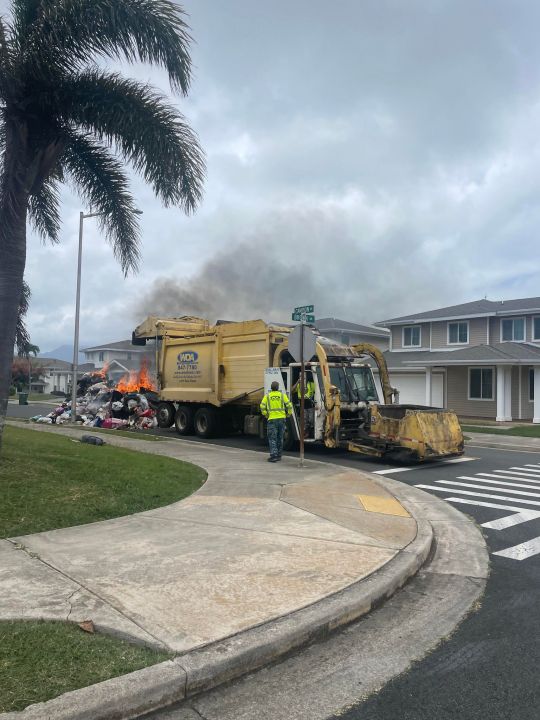HONOLULU (KHON2) — A massive pile of garbage was on fire next to a garbage truck. That was the sight Wednesday afternoon in the Mololani Community of Kaneohe Marine Corps Base Hawaii.
Kirk Tengan, general manager of West Oahu Aggregate Refuse Division, said the truck driver just finished servicing one of the sites when he smelled smoke.
“He got out of the truck, and he saw the load in the back of the truck on fire and immediately reported it to the contracted base Fire Department who responded,” Tengan explained.
He said the driver followed protocol and found a clear open area to discharge the load to prevent the situation from escalating.
“You know, truck has fuel and everything. So it’ll just be a really bad, bad situation and the truck itself caught on fire,” said Tengan.
He added that they’ve had at least four other garbage fires in the last 12 months.
Michael O’Keefe, the deputy director for environmental services, which handles trash for the city, said they see these kinds of fires too.
“It happens once every month or once every two months we get notification from our, one of our drivers that they have a load that’s smoking and it’s on fire,” he explained.
“How dangerous is this?” asked KHON2.
“It can be quite dangerous,” O’Keefe responded.
There have been a number of garbage truck fires that have happened on major roadways, resulting in serious situations.
When this happens the fire department is called to extinguish the fire, the area is cleared of the debris and the water is reclaimed to ensure toxic chemicals are not washed into storm drains.
O’Keefe said people need to be mindful of what they throw in the trash.
Items not allowed in the regular trash include helium, propane, oxygen tanks, hazardous chemicals, lead and aluminum paints, fluorescent lights, cell phones and other electronics. Motor and other oils can be discarded in regular refuse but first should be absorbed with rags or towels and put in a container.
According to O’Keefe and Tengan, the thing they are having the most problems with lately are lithium-ion batteries. They’re found in everything from cell phones, tablets and are also imbedded in popular items like e-bikes and scooters.
“In the process of compacting the trash any lithium-ion batteries that are contained in the trash, they’ll break apart and there’s a chemical reaction that causes it to flare up,” explained O’Keefe.
Charcoal from barbeques is another thing he said starts a lot of fires. People think the coals are out but they are not.
“For regular lithium-ion batteries, the types that aren’t embedded, like the power tools, and the cell phones, folks can take them to, right now, can take them to any one of the city’s seven convenient centers or our two transfer stations and drop them off there free of charge,” O’Keefe said.
He added that starting in July the city will accept items like scooters and e-bikes, with embedded lithium-ion batters, at their household hazardous waste drop-off days.
For more information about hazardous waste disposal, visit the DES’s Refuse Division website. You can also call 808-768-3200.
